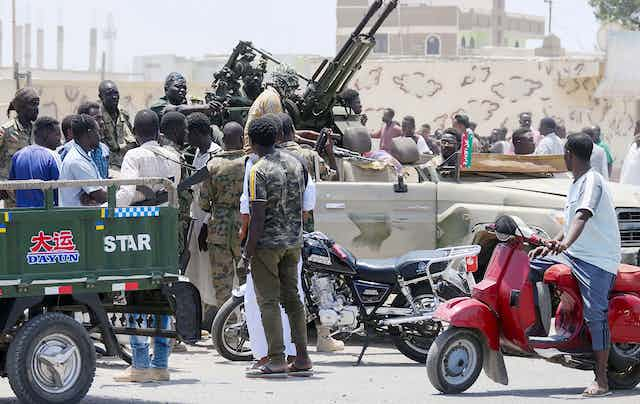UN Relief Coordinator demands end to Sudan conflict
The UN relief chief, Mr Martin Griffiths, has called on the international community to take “decisive and immediate action” to bring nearly nine months of brutal civil war in Sudan to an end and boost humanitarian relief.
The UN Emergency Relief Coordinator said in a statement on Thursday that as the conflict continued to spread “human suffering is deepening; humanitarian access is shrinking and hope is dwindling.”
He said a grim turning point between government troops and their rival RSF militia has been reached with the recent fighting in Aj Jazirah state, the country’s breadbasket.
No fewer than 500,000 Sudanese civilians have fled from the state capital region, “long a place of refuge for those uprooted from clashes elsewhere.”
Continuing mass displacement is also threatening to fuel the rapid spread of cholera there, Griffiths warned.
He said the same accounts of widespread rights violations and “horrific abuses” as in the capital Khartoum, Darfur and Kordofan, earlier in the conflict, were afflicting Wad Medani.
Furthermore, he warned that the fighting there – and looting of agency warehouses and supplies across what is a humanitarian hub – “is a body blow to our efforts to deliver food, water, healthcare and other critical aid.”
He said 25 million Sudanese would need help through this year but intensifying fighting may cut many off from lifesaving aid.
“Deliveries across conflict lines have ground to a halt”, he warned, which the violence is also threatening regional stability. The war has unleashed the world’s largest displacement crisis, uprooting the lives of seven million people.
“It’s essential now to protect civilians, facilitate humanitarian access and end the fighting,’’ he said.
In a related development, there was no respite from war over the holiday period, neither from country’s citizens, nor the UN workers attempting to deliver aid and support in Ukraine, according to a senior official for the UN migration agency (IOM).
Yuri Rudenko, National Programme Officer for IOM Ukraine, was on leave in his hometown of Dnipro on December 29, when a deadly air raid struck multiple Ukrainian cities, including Dnipro. He and his team were immediately pressed into action.
“On the days between Christmas and New Year, Ukrainians celebrate. Inspite of the war, it is the time when we give our kids presents, get together with friends and family and, for a few days, try to switch off from the harsh reality of almost two years of fear and bloodshed.We put on a happy demeanour and hope for a Christmas miracle.’’
Rudenko continued to narrate his experience when he woke up early on Dec. 29 to the air raid alerts, saying, Russian missiles were speeding towards Dnipro, Zaporizhzhia, Kyiv, Lviv and other Ukrainian cities.
He said the largest attack of the war was under way, with combat drones, cruise and ballistic missiles, and hypersonic weapons.
“There was no time to analyze or rationalize. I had to organise and coordinate IOM’s humanitarian response right away. Information rushed at me, and I quickly learned that many civilians were dead and injured, and their homes damaged.
“The whole nation was in shock. Not even maternity hospitals were spared. My city, Dnipro, is one of the largest cities in Ukraine – home to over one million people. With the start of the full-scale war, it became a frontline city hosting around 150,000 displaced people. He, however, thanked his colleagues for their timely response to the humanitarian crisis.
“They hired trucks out of nowhere in the blink of an eye and got them to warehouses, where they were loaded and dispatched to the worst affected neighbourhoods.
“No matter their level of seniority, all colleagues pitched in to ensure goods were delivered to the people that needed them most.
“Twelve hours after the huge attacks we’d provided 420 Emergency Shelter Kits to local residents and displaced persons in Dnipro city, and 100 kits to the local authorities, enabling them to continue assisting vulnerable civilians in the region.
“It wasn’t the Christmas miracle we had hoped for, but at least we helped our neighbours stay warm, and showed them that they will never have to face adversity alone. Not at Christmas, not at New Year. Never.”
NAN / Foluke Ibitomi


Comments are closed.